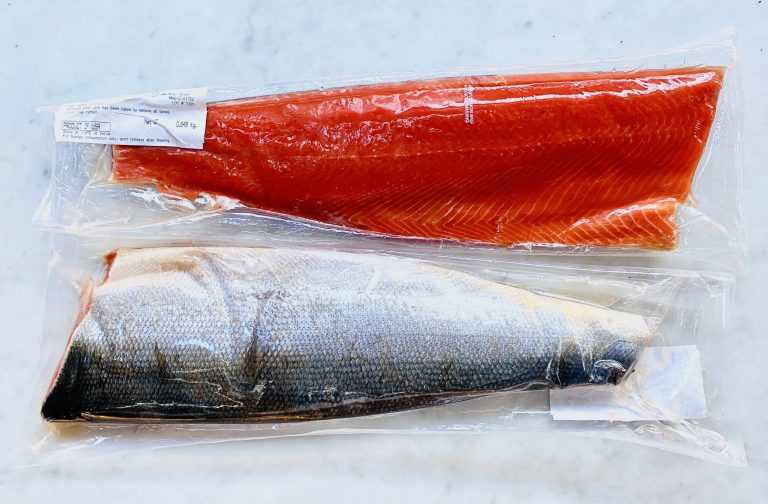Are you craving a delicious salmon dinner but worried about whether it’s still good to eat? We’ve all been there—standing in front of the refrigerator, unsure if that piece of salmon is safe or if it has gone bad. But fear not because we’re here to help you determine just that!
Wondering what does bad salmon look like? In this article, we will guide you through the signs and techniques to tell if your salmon is safe to consume.
Ready to dive into the world of salmon freshness? Let’s get started and learn how to tell if salmon is bad to eat.
How Long Does Fresh Salmon Stay Good?
Fresh salmon stays good for up to two days in the refrigerator, while cooked salmon leftovers can last three to four days. But how do you know if salmon is bad and should be thrown away?
Well, there are a few indicators to look out for. First is sight. Consumable salmon should look pink. The second is touch. The texture of the salmon shouldn’t be mushy, slimy, or sticky. Finally—smell. If the salmon has a strong fishy smell, ammonia smell, or rancid/sour odor, it’s time to throw it out.
How Long Can Fresh Salmon Last in the Fridge?
Refrigerate raw salmon within two days to ensure its longevity.
It’s important to know that fresh salmon should have a mild fishy smell, but it should not smell expired or overly fishy. So, should salmon smell fishy? Yes, but not in an unpleasant way. If your salmon smells strong and funky, it’s a sign that it may be spoiled.
How To Tell if Salmon Is Bad

So, what does spoiled salmon look like? To determine if your salmon has spoiled, check for any unusual changes in its appearance or smell. As we said, discoloration or dark spots are the first indicators of an out-of-date salmon.
Fresh salmon should have a bright pink-orange color with shiny silver skin. If the flesh looks dull or gray, it may indicate a lack of freshness. Dark spots or discoloration are clear signs of spoilage.
Another way to assess the freshness of salmon is by its smell. Fresh salmon should have a neutral odor, while spoiled salmon will have a strong fishy smell or even an ammonia-like or rancid scent.
Does Bad Salmon Taste Different?
Spoiled salmon can have a distinct and unpleasant taste. When salmon goes bad, it can develop a strong, fishy flavor that is off-putting. The taste may be rancid or sour, indicating that the salmon is no longer safe to eat.
It is important to trust your taste buds and avoid consuming salmon that tastes different from its usual fresh and mild flavor. If you notice any off flavors or an unpleasant aftertaste, it is best to discard the fish to avoid any potential health risks.
How To Ensure Safe Consumption of Salmon

Many wonder how to know if salmon is bad. When determining the freshness of salmon, it is important to rely on visual indicators such as appearance, texture, and smell. As we said, look out for the following signs:
- Look for a bright pink-orange color and shiny silver skin, as dull or grayish skin indicates a lack of freshness. Check for any dark spots, mold, or white, filmy residues, as these are signs of spoilage.
- In terms of texture, fresh salmon should feel firm and moist, with flesh that springs back when pressed. Slimy or sticky residues are indicators of spoilage, and breakable flesh should be avoided.
- Pay attention to the smell. Fresh salmon has a neutral odor, while a strong fishy smell or ammonia-like scent suggests spoilage.
The Dos and Don’ts of Preserving Salmon

If you want to ensure the freshness and quality of your salmon, follow these dos and don’ts for preserving it:
- Do keep your packaged salmon refrigerated and pay attention to the sell-by date. If you have salmon from the butcher counter, it won’t be labeled with a date, so use it within two days. Cooked salmon leftovers can last three to four days in the refrigerator.
- If you can’t find a sell-by date on your salmon, use the guidelines from the USDA . To extend the shelf life, freeze uncooked salmon within three months and cook it within six months.
- Don’t leave fresh fish out at room temperature for too long. Remember, proper storage is key to keeping your salmon fresh and safe to eat.
Conclusion
It is important to note that there are cases when salmon smells fishy but not expired. The aroma of salmon is natural and can vary depending on its freshness and preparation.
So, how do you know when salmon is bad? To ensure the quality and safety of salmon, it is recommended to purchase it from trusted sources, check for any signs of spoilage, and properly store and cook it. By doing so, one can enjoy the delicious and nutritious benefits of salmon without any concerns about its freshness.
FAQs
What does bad salmon smell like?
Bad salmon typically has a strong, unpleasant, fishy odor. It may also have a sour or ammonia-like smell. This is often a clear indication that the salmon is spoiled and unsafe to consume. It’s important to discard any salmon with a strong, off-putting odor to avoid foodborne illnesses.
How can you tell if frozen salmon is bad?
If frozen salmon is bad, it will have noticeable signs such as a strong fishy smell, slimy texture, discoloration, or freezer burn. Additionally, if the salmon has been stored for an extended period beyond its expiration date, it is likely unsafe to consume. Always trust your senses and look for any obvious signs of spoilage before consuming frozen salmon.
What does normal salmon smell like?
Normal salmon typically has a mild, slightly fishy aroma. However, the smell should not be overpowering or offensive. The flesh of fresh salmon should have a clean scent reminiscent of the sea. It is important to note that if the fish smells overly strong or has an unpleasant odor, it may be a sign of spoilage.
Does salmon expire if frozen?
No, salmon does not expire if frozen. When properly stored at 0°F (-18°C) or below, frozen salmon can remain safe to eat indefinitely. Freezing prevents bacteria and other microorganisms from growing, preserving the quality and freshness of the fish. However, although it does not technically expire, frozen salmon may gradually develop freezer burn and lose its flavor and texture over time.
How can you tell if salmon is good quality?
To determine if salmon is good quality, first, check for vibrant colors. Fresh salmon should have a bright, vibrant hue. Additionally, look for firm flesh that springs back when touched. Good quality salmon should also have a mild, fresh ocean scent. Finally, ensure that the fish is properly stored and handled to maintain its freshness.













